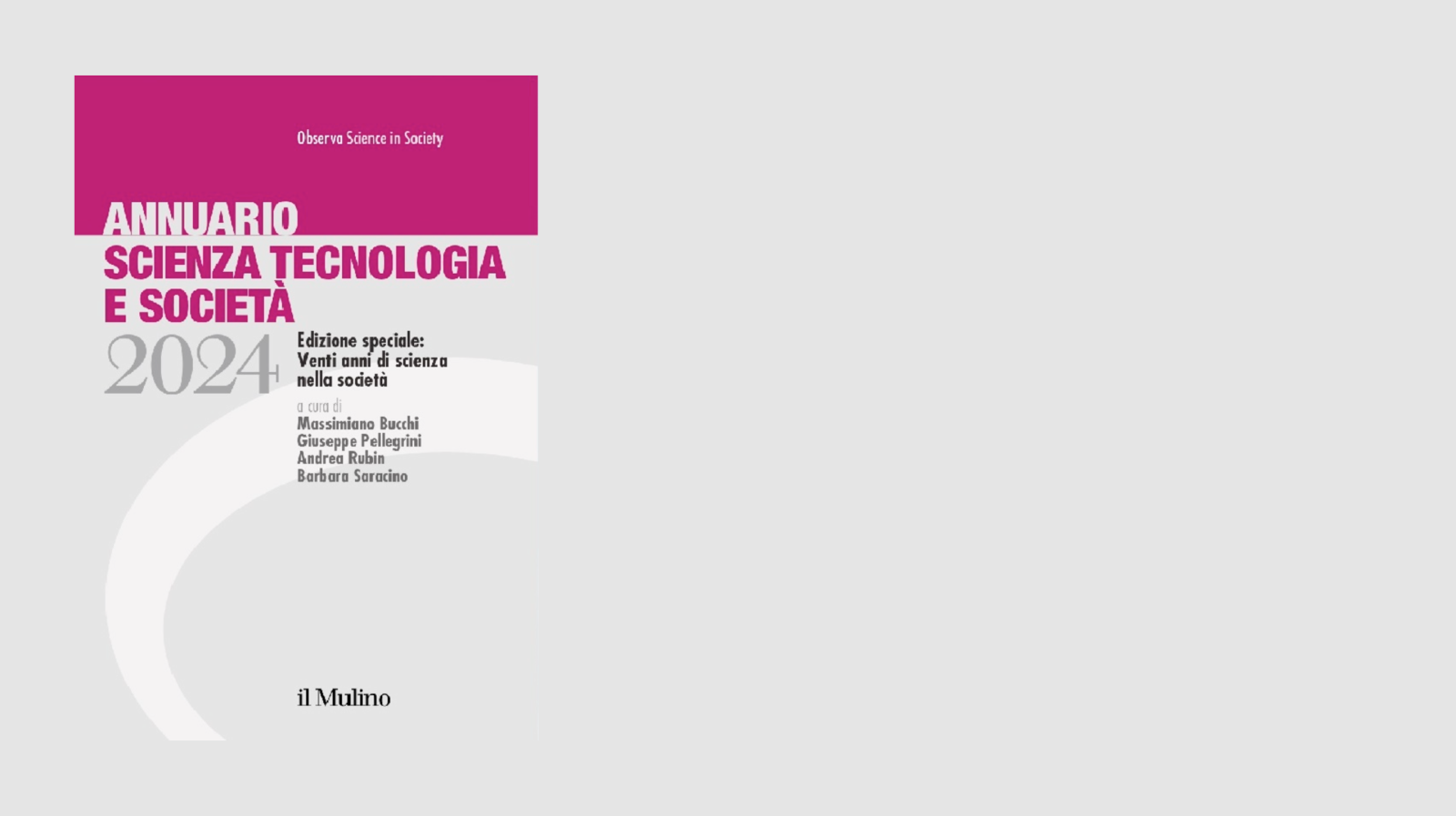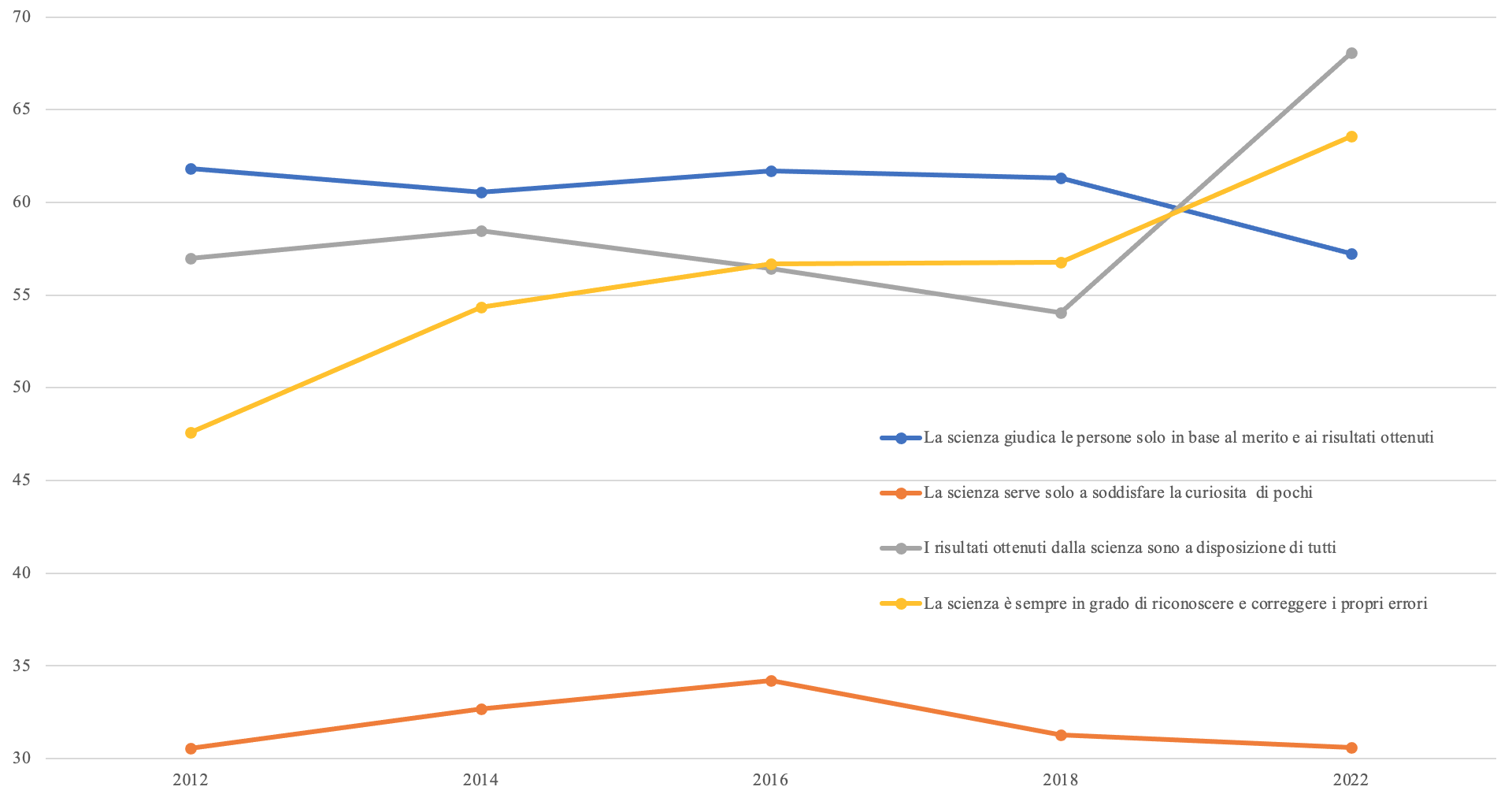
It will be presented on March 18 the 20th edition of the Science Technology and Society Yearbook by Observa, which gathers twenty years of data to provide an overview of the most significant dynamics and trends in the relationships between science, technology, and society. Here is our review of the report.
Often when the Italian speaker discusses any topic, they express their opinions. The Anglo-Saxon speaker, on the other hand, often starts by presenting data, and then, if really necessary, offers their opinion. The group in Italy that systematically adopts a data- and statistics-based approach to discuss science and society is Observa, composed of Massimiano Bucchi, Giuseppe Pellegrini (both at the University of Trento), Andrea Rubin (University of Ferrara), and Barbara Saracino (University of Bologna), who coordinates the activities of the Observatory on Science, Technology, and Society at Observa. Being a devoted reader of their annual reports, I was particularly pleased to receive the 2024 Yearbook, which analyzes twenty years of data collected on a representative sample of the Italian population.
And what do these data tell us? First of all, that Italian society has significantly increased its basic scientific knowledge: since 2007, Observa has been presenting the following statements to a sample of 1000 people to test the degree of "scientific literacy":
- Electrons are smaller than atoms
- Antibiotics kill both viruses and bacteria
- The Sun is a planet
And, since 2018:
- Nitrogen is the most abundant element in the air;
- The bit is the unit of measurement of information quantity
It's trivial to say which are true and which are false, our readers might say. Actually, not so much. To the first three statements, today more than 60% of the sample responds correctly compared to percentages that varied from 38 to 50% (that of the Sun) in 2007. On the two additional ones (nitrogen and bit) over the 5 years examined, we are also around 50% of the sample.
It is comforting to see that things are improving, but it is also worrying to know that 40% do not know that the Sun is a star and that antibiotics do nothing against viruses. On the other hand, the statistics section that, as in all editions, concludes the Yearbook only confirms our country's low position in spending on education. And penultimate, just ahead of Romania, in the rate of graduates and PhDs among the 27 EU countries. So, what is there to be surprised about?
However, scientific knowledge is increasingly spreading among the Italian population, thanks also to a significant growth in scientific information, as shown by the data that take into account the most followed media (still far ahead is television, but with a decided increase of social media, particularly Instagram). In the last twenty years, there has been especially the rise of blogs and social accounts managed by science communicators or directly by scientists, whose followers have tripled from 11% of the sample in 2015 to 30% in 2023. Another growing phenomenon are the science festivals, in number and audience (15 percentage points more from 2007 to 2022). But I would say that the fact that struck me the most is the credibility that nearly half of the Italians primarily assign to scientists, whose public lectures lead all other forms of scientific information. Today, they are the most trustworthy figures, much more than politicians, environmentalists, journalists, and other social subjects. The trust also extends to scientific institutions.
The success of science, particularly among the younger and more educated public - those whom Observa defines as the Enthusiasts and the Informed Confidents who make up 42 percent of the sample - entails a good dose of idealization. Indeed, the share of people who see science as the only source from which one can expect "the truth about man and his place in the world" is growing. And this because science is open to all, based on merit and the control exercised by a cohesive and competent community, ready to recognize mistakes and correct them. This image of science - according to our sample - has two enemies to watch out for: politics (in all its ideological breadth) and the economic interests that compromise its ethics based on disinterest. And, as the data collected in the aftermath of the pandemic teach, science should also beware of the media exposure of its representatives and the frequentation of journalists and TV entertainers. Therefore, while it might be a good deal for political parties to nominate a host of scientists for the next elections, it might not be so for the scientists, destined to quickly contaminate their Mertonian heritage in the political arena.

This sizable phalanx of science enthusiasts remains quite disoriented even in the face of opposing opinions embraced by scientists. Perhaps it's inevitable that the growth experienced by the scientific information offer over the last decade comes with an idealized image of how science works, and that a more critical, realistic, and pluralistic view belongs to a narrow minority, both among the public and probably among researchers themselves.
Then let's not forget that there's the other side of the Moon, that 55% of the Italian population made up of 30% Disillusioned and 25% Misinformed. Those who don't trust science precisely because they know it and have learned to distrust it, or because they don't know it and thus distrust it regardless. Here lies misinformation and conspiracy theories, of which social media in their two-faced nature are the greatest amplifiers. Here we find the no-vaxxers, as well as the truthfully diminishing phalanxes of no-tech "naturalists" and pro-life religious groups. Or those who do not fear scientific and technological development as such, but because it's too rapid and destructive of ancient certainties. Or even worse, of their jobs. In this colorful panorama of tribes, we also find the oldest, the poorest, the most marginalized, towards whom it would be proper to direct new efforts in education and scientific information.
The Observa Yearbook touches on other interesting topics, such as the relationship between cinema and TV series with science (including a list of the top 20 films and series of the last decade), and the desired transition from a paternalistic model of dissemination to one based on active audience engagement, as various science festivals try to do. There's obviously also a part that concerns the pandemic, which on one hand showed the unpreparedness of the media and experts themselves to explain what was happening, and on the other allowed us to see "science in action" live during a period of profound uncertainty. Something that, in my opinion, is more instructive than believed.
The report also emphasizes how science owes much of its popularity to the emerging environmental sensitivity of the younger generations. Movements like Fridays for Future take very seriously what science is telling us. Starting with that Swedish girl who, in the sweltering summer of 2018, began to protest alone in front of the Stockholm parliament with the sign “Skolstrejk för klimatet”.

